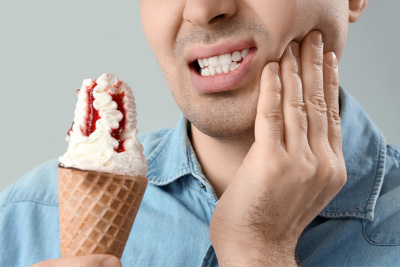Do Adults Get as Many Cavities as Children? Here’s Why—and How to Avoid Them
Tue, Sep 3rd, 2024
When we think of cavities, we often picture children with candy-stained smiles. However, the reality is that adults are just as susceptible to cavities as children, if not more so.
In fact, as we age, our oral health requires more attention, not less. But why do adults get cavities, and what can be done to prevent them? In this post, we'll explore these questions and offer tips for keeping your teeth healthy for life.
Why Adults Get as Many Cavities as Children?
Adults can and do get cavities just as often as children. In some cases, adults may even be more prone to cavities due to several factors, including:
- Receding Gums: As we age, our gums tend to recede, exposing the roots of our teeth. Unlike the crown of the tooth, which is protected by enamel, the root is covered by a much softer substance called cementum. This makes the root more susceptible to decay.
- Dry Mouth: Many adults, especially those taking medications, suffer from dry mouth. Saliva plays a crucial role in washing away food particles and neutralizing acids produced by bacteria in the mouth. A decrease in saliva flow can lead to a higher risk of cavities.
- Old Dental Work: Fillings, crowns, and other dental work from previous cavities can wear down over time, creating crevices where bacteria can hide and cause new cavities.
- Diet and Lifestyle: Adults often consume a diet high in sugars and acidic foods, both of which contribute to tooth decay. Additionally, habits like smoking or excessive alcohol consumption can weaken teeth and increase the risk of cavities.
- Neglecting Regular Dental Visits: Life gets busy, and many adults skip regular dental check-ups. Without these visits, early signs of cavities or gum disease can go unnoticed and untreated, leading to more significant problems down the road.
Why Are Adults Prone to Cavities?
There are several reasons why adults may be prone to cavities:
- Changes in Oral pH: As we age, our saliva can become more acidic, making it easier for cavities to form. This change can be exacerbated by certain foods, drinks, and medications.
- Wear and Tear: Over time, the enamel on our teeth wears down. This natural erosion makes teeth more vulnerable to decay.
- Increased Risk of Gum Disease: Gum disease, which becomes more common with age, can lead to receding gums and exposure of tooth roots, increasing the risk of cavities.
- Reduced Immune Function: Our immune system can weaken with age, making it harder for the body to fight off infections, including those caused by bacteria in the mouth.
How to Avoid Cavities
The good news is that cavities are largely preventable. Here are some tips to keep your teeth healthy and cavity-free:
- Brush and Floss Regularly: Brushing twice a day and flossing daily are the cornerstones of good oral hygiene. Make sure to use fluoride toothpaste, which helps strengthen tooth enamel and protect against decay.
- Use Mouthwash: Antimicrobial mouthwashes can reduce the amount of bacteria in the mouth, while fluoride rinses can help strengthen teeth.
- Maintain a Healthy Diet: Limit sugary snacks and beverages, and avoid acidic foods that can erode tooth enamel. Instead, focus on a balanced diet rich in fruits, vegetables, and whole grains.
- Stay Hydrated: Drinking plenty of water helps keep your mouth moist and rinses away food particles and bacteria.
- Chew Sugar-Free Gum: Chewing sugar-free gum after meals can stimulate saliva production and help neutralize acids in the mouth.
- Visit the Dentist Regularly: Regular dental check-ups and cleanings are essential for catching cavities early and maintaining overall oral health.
Your dentist can also provide fluoride treatments or dental sealants to offer additional protection against cavities.
Ways to Keep Your Teeth for Life
Beyond avoiding cavities, there are several steps you can take to ensure your teeth stay healthy for life:
- Protect Your Teeth from Injury: Wear a mouthguard during sports or other activities where there's a risk of injury. This can prevent chipped or broken teeth.
- Don't Use Your Teeth as Tools: Avoid using your teeth to open packages or bottles. This can cause cracks or breaks in your teeth.
- Quit Smoking: Smoking is a major risk factor for gum disease, which can lead to tooth loss. Quitting smoking can significantly improve your oral and overall health.
- Address Dental Issues Promptly: If you experience any dental problems, such as a toothache or gum inflammation, seek treatment right away. Ignoring these issues can lead to more severe problems, including tooth loss.
- Consider Dental Treatments: If you're at high risk for cavities or gum disease, talk to your dentist about preventive treatments such as fluoride varnishes, dental sealants, or deep cleanings.
- Practice Good Oral Hygiene at Home: Beyond brushing and flossing, make sure you're using the right techniques. Your dentist can provide guidance on the best ways to care for your teeth at home.
While cavities are common in both children and adults, they are not inevitable. By understanding the factors that contribute to cavities and taking proactive steps to maintain your oral health, you can keep your teeth strong and healthy for life. Regular dental visits, good oral hygiene practices, and a healthy lifestyle are the keys to a bright, cavity-free smile. Contact Arnold Dentistry for all of your dental needs!






